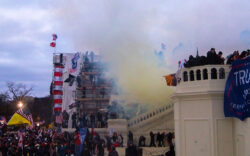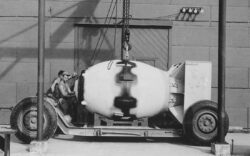Sept. 11 was the 22nd anniversary of the terrorist attacks on the United States in 2001. The date was also the 50th anniversary of “the other 9/11” when a bloody coup and a fascist dictatorship began in the South American country of Chile on Sept. 11, 1973. The military coup in Chile was supported by powerful U.S. corporate interests and by President Richard Nixon and his secretary of state, Henry Kissinger.
In a free and fair election, Chilean voters had elected a socialist, Salvador Allende, as their president. Powerful men in Washington and on Wall Street disagreed with that democratic decision, including Kissinger, who hissed, “I don’t see why we need to stand by and watch a country go communist due to the irresponsibility of its people. The issues are much too important for the Chilean voters to be left to decide for themselves.” Instead, Chilean Army Gen. Augusto Pinochet seized the reins of power in the country, beginning a fascist dictatorship that would last for almost 17 years before Chile returned to democracy.
Chile’s population was less than 11 million when Pinochet’s military junta took control, but during his repressive regime more people died in the aftermath of Chile’s 9/11 than were killed in the 9/11 attacks on the United States in 2001. The fascist Sept. 11 coup in Chile shocked that nation then just as another Sept. 11 would shock this nation 28 years later, in 2001. To this day, Chileans observe Sept. 11 as a day of remembrance and rededication to democracy.
More than 3,000 people were killed by Pinochet’s thugs during his Chilean dictatorship, and thousands more were tortured during his regime. Others vanished or were forced into exile. Dissidents were herded into concentration camps during the coup. Torture of political prisoners was widespread under the junta, and jails were overflowing.
A Chilean Navy sailing ship, the Esmeralda, was turned into a floating jail and torture chamber during the coup. The same vessel that was used by fascists was twice welcomed to American celebrations of freedom. During the July 4, 1976 Bicentennial celebrations, Esmeralda was cheered during a “tall ships” parade in New York Harbor. On July 4, 1986 President Ronald Reagan welcomed the ship back to New York Harbor when the Statue of Liberty turned a century old. Meanwhile, the lights of liberty were dimmed in Chile.
Most of those murdered or tortured during the right-wing coup in Chile were then and remain now known only to their friends or families. One whose name lives on in Chile and around the world was Victor Jara, a Chilean musician and poet who sang songs of hope and protest in his beleaguered nation. Jara was quickly arrested and jailed when Pinochet and his henchmen took over Chile fifty years ago. Confined with thousands of other political prisoners inside a soccer stadium that served as a makeshift prison during the coup, Jara was tortured and murdered by Pinochet’s goons, and his bullet-riddled body was thrown into the street outside the stadium of sport that had been turned into a house of horror.
In his last poem, smuggled out of prison just before he was murdered by the right-wing regime, Jara wrote of the macabre scene inside the stadium: “We are 5,000, here in this little corner of the city. How many are we in all the cities of the world? All of us, our eyes fixed on death.”
Jara was only 40 when he died, but he left a legacy of courage and commitment. Kissinger just turned 100. He was lionized on his birthday recently, but the stain of the murderous Chilean dictatorship will forever be a blight on his legacy.
Dictatorship in Chile is gone, but fascism marches on. Proud Boy street brawlers here in the United States wear T-shirts with the pro-fascist message “Pinochet Did Nothing Wrong.” In contrast, Jara used music and poetry as his message, with such lines as, “Song is like the rain that washes the stones, the wind that cleans us, like the fire that joins us together and lives to make us better people.”
Like what you just read? Support Flagpole by making a donation today. Every dollar you give helps fund our ongoing mission to provide Athens with quality, independent journalism.










